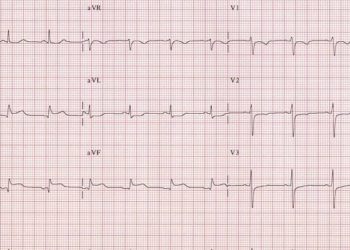Renal artery denervation is effective and well-tolerated for blood pressure reduction
1. Patients assigned to renal artery denervation had significantly lower office and ambulatory blood pressures at 36-month follow-up compared to sham control.
2. Renal artery denervation was well-tolerated with similar rates of the composite safety endpoint at 48 months between treatment groups.
Evidence Rating Level: 1 (Excellent)
Study Rundown: Hypertension is a medical condition that significantly increases the risk of other diseases, including those of the heart, brain and kidney. The SYMPLICITY HTN-3 trial evaluated the use of renal artery denervation for the management of treatment-resistant hypertension. Participants were randomly assigned to either treatment (renal artery denervation) or sham control, with the option of being included in a crossover group after 6 months. After 36 months, renal artery denervation significantly reduced systolic blood pressure, both in-office and ambulatory, compared to sham control. Renal artery denervation additionally significantly increased time in the therapeutic window compared to sham control. The rate of the composite safety endpoint, including all-cause mortality, was comparable between the two groups. Limitations of this study include the smaller sham control group size considering the number of patients that crossed over. Nonetheless, this study supports the use of renal artery denervation as an effective treatment for patients sub-optimally controlled on medication.
Click to read the study in The Lancet
In-Depth [randomized controlled trial]: SYMPLICITY HTN-3 was a randomized controlled trial conducted across 88 centres in the USA. Eligible patients were aged 18 to 80 years with treatment-resistant hypertension (office systolic blood pressure > 160 mm Hg or 24 h ambulatory systolic blood pressure > 135 mm Hg) on three or more drugs including a diuretic. A total of 535 enrolled patients were randomly assigned 2:1 to receive either renal artery denervation or sham control. The mean age of the participants was 57.9 years and 61% were men. The primary endpoint was the change in office systolic blood pressure at 6 months. After 6 months, patients were unmasked, and eligible participants who had received the sham control were offered cross over to receive renal artery denervation. After 36 months, the change in office systolic blood pressure was -26.4 mm Hg in the treatment group and -5.7 mm Hg in the sham control group (adjusted treatment difference -22.1 mm Hg [95% CI -27.2 to -17.0]; p < 0.0001). At the same time point, the change in ambulatory systolic blood pressure was -15.6 mm Hg in the treatment group and -0.3 mm Hg in the sham control group (adjusted treatment difference -16.5 mm Hg [-20.5 to -12.5]; p < 0.0001). Time spent in therapeutic blood pressure range was also significantly higher in the treatment group compared to control (p < 0.0001). There were no late-emerging complications from renal artery denervation. The rate of the composite safety endpoint at 48 months was 15% for the treatment group, 14% for the crossover group, and 14% for the non-crossover group.
Image: PD
©2022 2 Minute Medicine, Inc. All rights reserved. No works may be reproduced without expressed written consent from 2 Minute Medicine, Inc. Inquire about licensing here. No article should be construed as medical advice and is not intended as such by the authors or by 2 Minute Medicine, Inc.








